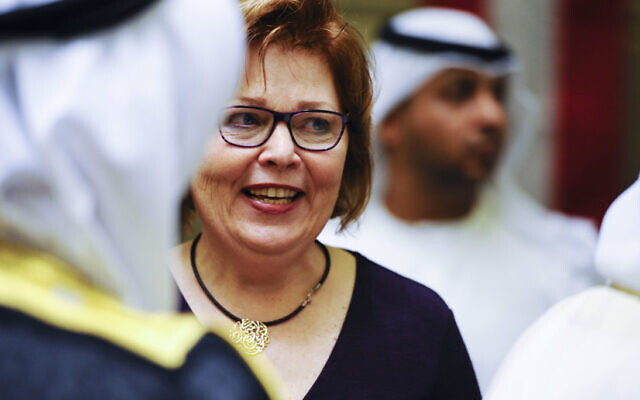Israel normalization on agenda as Blinken heads to Saudi Arabia next week
State Department says secretary will work to advance regional integration and is looking for opportunities short of full-on normalization between Riyadh and Jerusalem
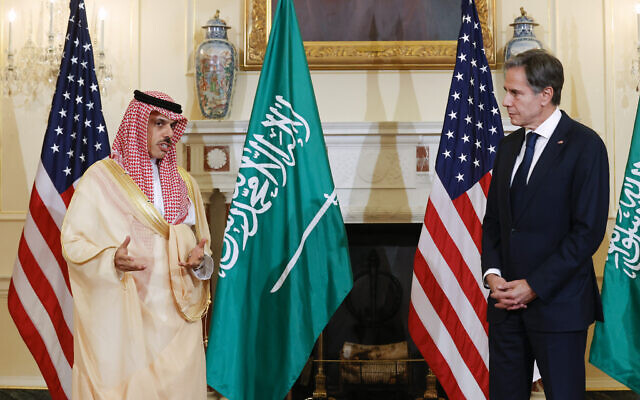
WASHINGTON — US Secretary of State Antony Blinken will travel to Riyadh next week, with warming ties between Israel and Saudi Arabia on the agenda for talks with senior Gulf officials.
During the June 6-8 trip, Blinken will “discuss US-Saudi strategic cooperation on regional and global issues and a range of bilateral issues including economic and security cooperation,” the State Department said.
He will participate in a ministerial meeting on Wednesday with the Gulf Cooperation Council “to discuss the growing cooperation with our GCC partners to promote security, stability, de-escalation, regional integration and economic opportunities across the Middle East.”
On Thursday he will participate in a Riyadh meeting of the coalition of countries fighting the Islamic State group.
Deputy Assistant Secretary for Arabian Peninsula Affairs Daniel Benaim reiterated the administration’s support for expanding the Abraham Accords during a briefing Friday previewing the trip.
“You’ve seen us and you will see us seek out opportunities short of formal diplomatic normalization to pursue progress,” Benaim said, highlighting US-coaxed decisions by Saudi Arabia and Oman to open their respective skies to Israeli overflights.
Benaim declined to comment when pressed on how the Biden administration planned to broker a normalization agreement between Jerusalem and Riyadh, given the hardline makeup of Israel’s government. Most members of Prime Minister Benjamin Netanyahu’s cabinet are thought to oppose the type of concessions to the Palestinians that will likely be required to reach such a deal.
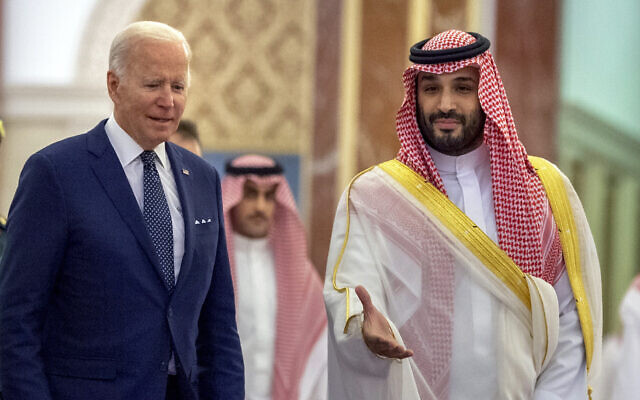
“There is indeed a lot of speculation out there, but I don’t want to preview the secretary’s conversations,” he said.
Blinken’s trip follows a recent visit to Saudi Arabia by White House National Security Advisor Jake Sullivan and nearly a year after President Joe Biden visited the country, with only mixed success in improving relations.
Ties between Washington and Riyadh are complex and have frayed over US accusations of human rights abuses in the kingdom and unhappiness that the Saudis raised oil prices in collusion with Russia to profiteer from Moscow’s invasion of Ukraine, rejecting US pleas to cap prices.
The 2018 murder of US-based Saudi dissident journalist Jamal Khashoggi by Saudi agents with ties to the monarchy continues to dog bilateral ties.
Last year Biden called for a review of the relationship after the Saudis cut oil production to force up prices.
But as the Saudis continue to play a powerful role in Middle East politics and Washington continues to arm its military, US officials don’t hide their hopes for a closer relationship.
Also on Blinken’s menu will be continuing efforts to end the fighting in Yemen, where Iran-backed rebel Huthis have battled Saudi-backed government forces for years.
Yemen, the poorest country on the Arabian Peninsula, has experienced a period of calm since a truce negotiated by the United Nations in April 2022.
The big prize agenda item is the Israel normalization issue. Saudi Arabia is thought to be seeking several large concessions from the US in exchange for normalization.
Saudi officials have also made clear to the Biden administration that any agreement with Israel will have to include a significant gesture for the Palestinians, a senior US official told The Times of Israel in May.
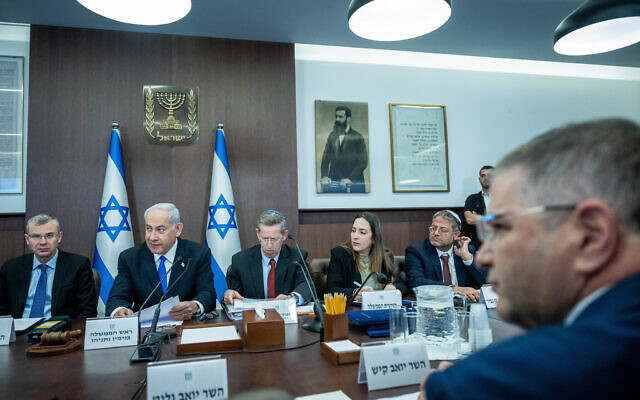
Formal Saudi recognition of Israel would amount to a geopolitical shock to the region.
The State Department looked into the possibility of having Blinken fly to Israel after his trip to Saudi Arabia but moved away from the idea shortly thereafter upon realizing that there wasn’t enough time in his schedule to add another stop, an Israeli official told The Times of Israel on Thursday.
A day earlier, a senior Biden administration official appeared to pour cold water on some recent optimism in Israel, flogging “misreporting” in the Israeli press about US efforts to broker the ever-coveted normalization agreement.
The remarks by US Assistant Secretary of State for Near Eastern Affairs Barbara Leaf Wednesday followed several reports purporting to reveal breakthroughs in the negotiations and new details on supposed conditions that the US and Saudi Arabia had set in exchange for reaching a deal with Israel.
“There’s a lot of misreporting and a lot of hyperventilation in the press, a lot of excitable rumination in the press, especially in the Israeli press,” Leaf said during her testimony before the Senate Foreign Relations Middle East, North Africa, South Asia, and Central Asia Subcommittee.
Leaf clarified that an Israel-Saudi agreement was still “no question an end goal” for the Biden administration and that Saudi Crown Prince Mohammed bin Salman has also vocalized “that is clearly a thing he’s got in mind as a step he wants to move to[ward].”
While hosting this year’s Arab League summit earlier last month, bin Salman stressed his commitment to Palestinian statehood at the Arab League summit.
“We will not delay in providing assistance to the Palestinian people in recovering their lands, restoring their legitimate rights and establishing an independent state on the 1967 borders with East Jerusalem as its capital,” he said in his address to the Jeddah conference. “The Palestinian issue was and remains the central issue for Arab countries, and it is at the top of the kingdom’s priorities.”
The comments were largely standard for leadership in Riyadh, which has long insisted publicly that it remains committed to the Palestinian cause and will only normalize ties with Israel after a two-state solution has been reached.
This has not stopped the Biden administration from working to strike a deal between Jerusalem and Riyadh, with Sullivan calling it a “national security interest” earlier in May.
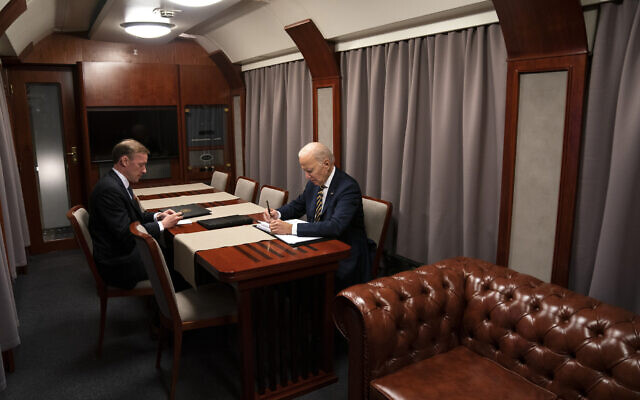
A senior Middle East diplomat told The Times of Israel in March that Riyadh has asked the US to green-light its development of a civilian nuclear program in exchange for the kingdom normalizing relations with Israel.
The civilian nuclear program is among several demands Riyadh has presented in talks with the Biden administration over the past year, the diplomat said, while clarifying that such a deal remains “very far off.”
Further complicating the effort, Saudi Arabia is also conditioning a normalization deal with Israel on a significant expansion of defense ties with the US, including a system of guarantees to prevent future administrations from pulling out of weapons deals that have already been signed, the diplomat said.
The diplomat speculated that a Palestinian-related demand would likely be raised toward the end of the negotiations.

